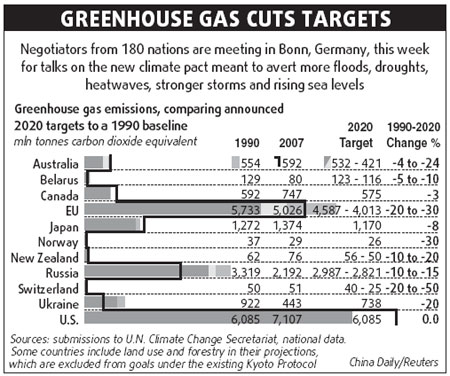Chinese officials and researchers said yesterday they were "deeply disappointed" by the lower-than-expected greenhouse emission cuts the industrialized countries have pledged at the on-going Bonn talks.

They said the proposal by the rich nations forebodes a "gloomy future" for a new climate change deal scheduled to be reached in December in Copenhagen.
The industrialized countries proposed to cut greenhouse gas emissions by between 15 and 21 percent below 1990 levels by 2020 under a new UN climate pact.
About 1,000 negotiators are meeting in Bonn this week to discuss the new proposal, which falls short of cuts of between 25 and 40 percent outlined by a UN panel of scientists to avert the worst of global warming such as heat waves, floods and rising sea levels.
China has asked developed countries as a whole to commit to at least a 40 percent emission cut during 2012-20 period.
"The new proposal by the industrialized countries is not enough for sure," said Li Liyan, a climate change official with the National Development and Reform Commission, a cabinet department partly responsible for designing policies on global warming.
She said whether the international community can reach a "positive deal" in December to replace the current Kyoto Protocol which expires in 2012 heavily depends on whether the rich countries are willing to commit to deeper emission cuts.
Overall emissions by the 39 industrialized nations, based on the existing plans, would fall to the equivalent of between 10.71 and 9.86 billion tons of carbon dioxide in 2020 from 12.53 billion tons in 1990.
The data excludes the United States, the top greenhouse gas emitter after China, which is outside the current Kyoto Protocol obliging all other industrialized nations to cut emissions by an average of at least 5 percent below 1990 levels by 2008-12.
Hu Tao, a visiting professor on environment from Renmin University of China, said the 15-21 percent cut proposal is far below what the developing countries including China had expected.
"I am quite pessimistic about what deal the international community would achieve in Copenhagen," said Hu.
He criticized the industrialized countries for a lack of "stronger commitment" to save the planet. "They (the rich nations) are too selfish. They just want to press emerging countries such as China and India to take more responsibility," said Hu.
The industrialized nations have sought to include big greenhouse emitters in the developing world, notably China and India, in any treaty commitments.
The head of the US delegation in Bonn, Jonathan Pershing told BBC said that having those two countries included was "absolutely part of the deal."
"We can't solve this (problem) without them; you need them all and they all have to move immediately."
But US climate change envoy Todd Stern, who was visiting Beijing, told China Daily recently the US is not pursuing a mandatory cap on greenhouse gas emissions from China.
"We don't expect China to take a national cap at this stage," Stern said, adding that what China had already done was "very impressive", citing the 20 percent energy efficiency target the country had set for the current five-year plan (2006-10).
Lin Boqiang, director of the China Center for Energy Economics Research at Xiamen University, said "the goal of 15-21 percent doesn't make much sense if the biggest emitter the United States is excluded."
He urged the developed countries to offer financial and technological aid to developing countries such as China and India to cut emissions. "That is the way to bring them into the deal," said Lin.
WWF said that the industrialized countries that want to keep the temperature rise to within 2 C above the level of pre-industrial times must commit to emission cuts of 40 percent by 2020 from 1990 levels to back up their vision with real action.
Zhou Dadi, an expert with the NDRC's Energy Research Institute, also said the commitment of 15-21 percent cut goal is very low.
"This shows that the developed countries are not living up to the world's expectation," he said.
(China Daily August 13, 2009)